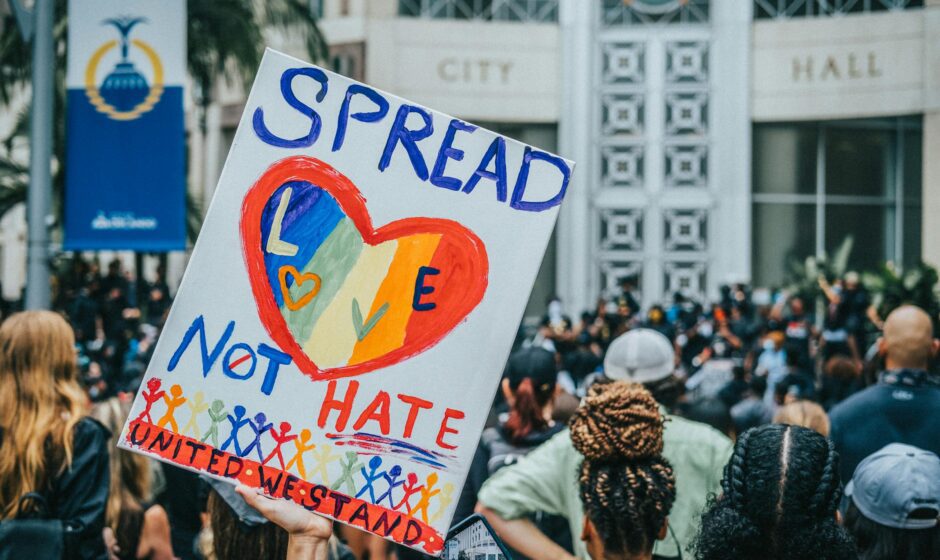Galactday: 55340.2
Amid the noise of modern political polarization, escalating partisan rhetoric and the rise of populist movements within the Republican Party, one truth remains steady: Americans are not willing to give up our right to choose our leaders —FULL STOP! Photo by Connor McManus
The democratic tradition, deeply woven into the fabric of the United States since its founding, has endured wars, economic collapses, civil rights upheaval and bitter cultural divides. Today, while some fear creeping authoritarianism from corners of the American right, there is little evidence to suggest that the broader population is ready to embrace a dictatorship or willingly surrender the cornerstone of American governance—free and fair elections.
This is not to ignore the troubling signs that exist. Since 2020, a faction of Republican leaders and voters have questioned the legitimacy of elections, promoted conspiracy theories about voter fraud, and even attempted to overturn a certified presidential election on January 6th. These efforts, while concerning, have not translated into a nationwide movement advocating for autocracy. Instead, they reflect a smaller segment of the population dissatisfied with election outcomes and willing to subvert democratic norms to maintain political power.
Authoritarianism in America doesn’t look like a column of tanks rolling down the street, they say. It looks like election denial, voter suppression, and the corrosion of trust in institutions—wrapped in patriotic language and eagles shooting out of your back.
The difference between supporting strong leadership and undermining democracy is subtle but important. Many Americans, particularly those frustrated with governmental gridlock or culture war battles, express support for politicians who promise to “get things done” or “take back the country.” But that sentiment rarely translates into a rejection of elections or advocacy for permanent rule.
Take Trump, who still exerts tremendous influence over the GOP. His supporters often portray him as a singular solution to national decline—someone who defies the establishment, a billionaire who “fights for the people” & portrays himself as the next Pope on social media. His opponents argue this personality cult veers dangerously close to authoritarianism. Yet even among his base, the belief that leadership should stem from popular vote persists, albeit selectively.
Still, there’s little evidence that the average American wants a strongman in place of a system that allows regular, peaceful transfers of power. Even among voters who express dissatisfaction with “the system,” turnout remains high. The 2020 presidential election saw the highest voter participation rate in over a century. And in the 2022 midterms, despite predictions of widespread apathy, turnout remained robust in many states.
This distrust doesn’t equate to a desire to end democracy. Instead, it highlights a battle over the definition of democracy itself. Some on the right argue that liberal policies, media narratives and social change are imposed by elites and do not reflect the will of “real Americans.” In that framing, undermining elections becomes an act of supposed restoration, not subversion.
The real danger isn’t that Americans will suddenly endorse authoritarianism, but that we’ll normalize anti-democratic actions because they’re carried out in the name of patriotism or faith. When state legislatures pass laws to restrict voting access, when leaders refuse to concede defeat, and when courts are weaponized against political opponents, it chips away at the mechanisms that ensure free choice.
Even so, most republicans continue to engage in the democratic process by voting, campaigning, and attending rallies—not by calling for the abolition of elections. Some express support for controversial election audits or new restrictions, but this reflects a distrust in institutions rather than a wholesale rejection of democracy.
This is why democratic resilience is more important than ever. Voting rights protections, civic education, local journalism and public trust in institutions are critical buffers against any authoritarian slide. So is civic engagement.
Despite the polarization and dysfunction that plague the system, millions of Americans continue to participate in the democratic process—voting in local and national elections, volunteering at polling places, running for office, and engaging in grassroots advocacy. The protests, debates and even the anger that characterize American politics today are not symptoms of failure, but of a society still invested in the idea that power should be accountable to the people.
Ultimately, democracy is not something Americans give up easily. It may be tested, undermined or distorted, but the core belief—that citizens should choose their leaders through elections—remains intact. Authoritarianism is unlikely to succeed in the U.S. not because of laws alone, but because the American people, despite their differences, are not ready to surrender their voice.




